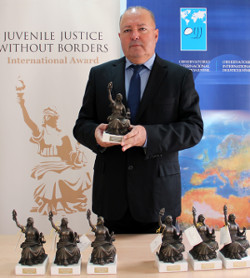
Dr. Francisco Legaz Cervantes
Chairman, International Juvenile Justice Observatory (IJJO)
Welcome words of the ‘Juvenile Justice Without Borders’ International Award on its 4th Edition, 2016
“It is an honour and a great joy for me, as Chairman of the Observatory, to welcome you to this new edition of the ‘Juvenile Justice Without Borders’ International Award, which in 2016 is celebrating its 4th Edition.
With this award, the Observatory recognizes and promotes on a global scale the magnificent work of those people and institutions who, through their actions, contribute to the improvement of juvenile justice systems, and to the protection of the rights of children and youth throughout the world.
Undoubtedly, the awardees of this edition are a clear example of this work. To all of them, I offer my sincere congratulations.
At the Observatory we hope that the recognition of these awardees will not only be a reward for their career, but a source of inspiration for the international community, professionals and future generations.”
IJJO Chairman's full welcome speech, presenting the awardeesThe awardees of this Fourth Edition are:
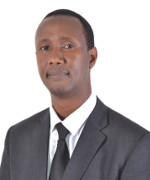
MR. AYUB MOHAMUD ABDI
HONORIFIC AWARD
Teacher, founder of Teachers Against Violent Extremism (TAVE) (Kenya)
Awarded for his dedication to preventing the recruitment of young people by extremist groups, educating new generations in the respect for human rights. As well as for his work to raise the awareness of educational professionals about the need to develop joint strategies to combat extremism in the classroom, providing children with the education they need to become the engine of African society.
 "I would like to accept and sincerely thank the International Juvenile Justice Observatory for this recognition and awarding me the Honorific Juvenile Justice without Borders International Award alongside other distinguished personalities. The work and mission of International Juvenile Justice Observatory, of protecting young people in conflict with the law who are vulnerable and targeted by violent extremist groups as foot soldiers or brides, fits with our work in Kenya of preventing young people being lured into violent extremist groups. Indeed, I’ll be honoured to work with International Juvenile Justice Observatory in the Horn of Africa, or in other parts of the world, to protect children against violence, abuse and indoctrination."
"I would like to accept and sincerely thank the International Juvenile Justice Observatory for this recognition and awarding me the Honorific Juvenile Justice without Borders International Award alongside other distinguished personalities. The work and mission of International Juvenile Justice Observatory, of protecting young people in conflict with the law who are vulnerable and targeted by violent extremist groups as foot soldiers or brides, fits with our work in Kenya of preventing young people being lured into violent extremist groups. Indeed, I’ll be honoured to work with International Juvenile Justice Observatory in the Horn of Africa, or in other parts of the world, to protect children against violence, abuse and indoctrination."
Ayub Mohamud Abdi
Biography
 Mr. Ayub Mohamud is an award winning Kenyan teacher recognised globally for his efforts preventing extremism in schools and communities.
Mr. Ayub Mohamud is an award winning Kenyan teacher recognised globally for his efforts preventing extremism in schools and communities.
He is the founder of Teachers Against Violent Extremism (TAVE), a platform for teachers tackling extremism in schools. Besides this, he also chairs the Community Development Initiative (CDI), a vibrant youth led community initiative on the prevention of extremism, and through his leadership regularly trains religious leaders, women, teachers, law enforcement agencies and young people to jointly come up with strategies to address the challenges posed by violent extremism in their communities.
He has received two medals from UNESCO and the Varkey Foundation for his courageous and innovative work on preventing violent extremism and radicalization. His work has been highlighted by the BBC, CNN, The New Yorker, the Financial Times, and The Huffington Post, among other leading media outlets. He is a member of The Global Teacher Prize Academy tasked with selection of an exceptional teacher to be awarded a 1 million dollar prize.
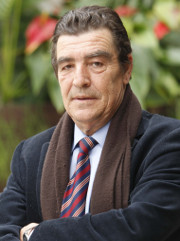
JUDGE EMILIO CALATAYUD
Juvenile Court Judge (Spain)
Awarded for his extensive experience in the application of juvenile legislation, highlighting the value he places on an educational and socialising approach to the law, as well as for his work raising society’s awareness of specialised juvenile justice, adapted to the circumstances and needs of the child.
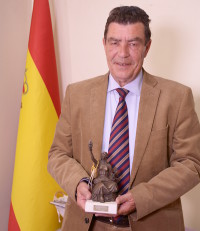 “The foundation of juvenile justice lies in the education of the children, and if you do not believe in this reform or the possibility of change within a person, especially in the case of minors, what will you believe in?”
“The foundation of juvenile justice lies in the education of the children, and if you do not believe in this reform or the possibility of change within a person, especially in the case of minors, what will you believe in?”
Emilio Calatayud
Biography
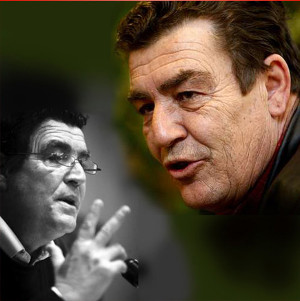 Emilio Calatayud graduated at ICADE and in Law from the University of Deusto in 1977. In 1980, he began his judicial career and was appointed to Güimar (Tenerife) as district judge. He worked as an assistant professor of penal law at the University of Laguna between 1981 and 1984. In 1984, he was appointed to the courts of Granada and ascended to the position of magistrate in 1987. In 1988, he specialised as a juvenile judge, a position he has been practicing in the same courts ever since. His exemplary educational sentences are well known; these sentences are adapted to the specific situation of every young person in order that they learn from their mistakes, correct them and integrate into society.
Emilio Calatayud graduated at ICADE and in Law from the University of Deusto in 1977. In 1980, he began his judicial career and was appointed to Güimar (Tenerife) as district judge. He worked as an assistant professor of penal law at the University of Laguna between 1981 and 1984. In 1984, he was appointed to the courts of Granada and ascended to the position of magistrate in 1987. In 1988, he specialised as a juvenile judge, a position he has been practicing in the same courts ever since. His exemplary educational sentences are well known; these sentences are adapted to the specific situation of every young person in order that they learn from their mistakes, correct them and integrate into society.
Judge Calatayud has given numerous seminars and courses on juvenile crime throughout his career, collaborating with the Institute of Criminology at the University of Granada since 1992, as well as with the Law School and the Local Policy Academy. He is also collaborates and lectures on the theme of minors in various Spanish universities and education centres.
In addition, he has co-authored a number of publications, such as Reflexiones de un juez de menores (2007), Mis sentencias ejemplares (2008) and Buenas, soy Emilio Calatayud y hoy voy a hablarles de… (2014).
During his lengthy career, Judge Calatayud has received a number of awards and recognitions, such as the ‘Flag of Andalusia’ (2001), the ‘Golden Medal of the Civil Order of Social Solidarity’ (2006), the ‘Special Medal in Education’ (2009), the ‘Golden Medal of Andalusia’ (2015) and the ‘Solidarity Award of the ONCE Foundation’ (2016).

THE MINISTRY OF JUSTICE AND LAW OF COLOMBIA
Represented by the Honourable Jorge Eduardo Londoño Ulloa, Minister of Justice and Law, and the Honourable Carlos Medina Ramírez, Vice-Minister of Criminal Policy and Restorative Justice.
Awarded for the work it carries out for the development of a comprehensive juvenile justice system, consistent with the international standards on children's rights, focused on the prevention of juvenile delinquency and the protection of the rights of children in situations of vulnerability; as well as for its work in the social reintegration of young people in conflict with the law.
English Translation - Acceptance letter from the Minister of Justice and Law, Mr. Jorge Eduardo Londoño Ulloa Carta de aceptación del Ministro de Justicia y del Derecho, D. Jorge Eduardo Londoño Ulloa “The recognition provided by the IJJO is of singular importance to the Ministry of Justice and Law; it increases the visibility of the work we have been engaging in with respect to adolescent crime prevention and the promotion of restorative juvenile justice from a rights-based standpoint, in which we give priority to preventative actions aimed at overcoming the reactionary approach imposed by punitive populism.”
“The recognition provided by the IJJO is of singular importance to the Ministry of Justice and Law; it increases the visibility of the work we have been engaging in with respect to adolescent crime prevention and the promotion of restorative juvenile justice from a rights-based standpoint, in which we give priority to preventative actions aimed at overcoming the reactionary approach imposed by punitive populism.”
Jorge Eduardo Londoño Ulloa,
Minister of Justice and Law
“This award represents an important recognition of the work that day by day is being carried out by our colleagues at the Criminal Policy Office in the field of juvenile justice in our country. The Ministry of Justice took on this significant challenge last year, coordinating the Juvenile System of Criminal Responsibility. It is important to emphasise that this award is truly a source of motivation for the Ministry of Justice for the challenges that lie ahead.”
Carlos Medina Ramírez,
Vice-Minister of Criminal Policy and Restorative Justice
Official Statement by the Ministry of Justice and Law on the System of Criminal Responsibility for Adolescents (SRPA)
“The Ministry of Justice and Law, operating within the framework of its competencies, is committed to guaranteeing the rights of those adolescents who enter into the System of Criminal Responsibility for Adolescents (SRPA); to this end, it has promoted different actions that enable them to exercise their rights and allow for the effective attainment of the objectives of the SRPA, in accordance with the principle of the best interest of the child and in response to its differential, pedagogical and restorative nature.
An area of principal interest and relevance to the Ministry is prevention, aimed at promoting conditions that stop children and adolescents from having to confront, at any moment in this stage of their lives, the System of Criminal Responsibility for Adolescents; actions are undertaken, within the framework of a respectful criminal policy that guarantees human rights, which are aimed towards prevention within the wider perspective of social inclusion, which in turn responds to the needs, issues and capacities that present themselves at a local, community and family level.
Equally, with a view to strengthening the System, it falls to this Ministry to coordinate and articulate the different actors in order to reinforce restorative justice; to consolidate an efficient and just system of investigation and differential judgement; and to protect and re-establish rights, so that once a sentence has been completed, adolescents and young people can freely exercise their rights as empowered citizens.”
Biographies
Jorge Eduardo Londoño Ulloa
Minister of Justice and Law
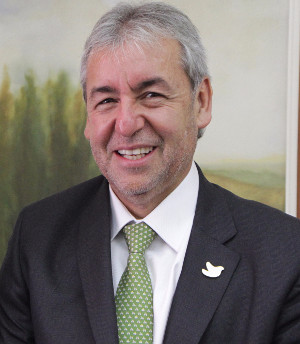 The Minister of Justice and Law, Jorge Eduardo Londoño Ulloa, was born in Puerto Boyacá in 1960 and graduated as a lawyer from the Externado University of Colombia in 1986. He has a specialisation in Comparative Public Law from the Institute of European Studies of Torino (Italy, 1988), a specialisation in Public Law from the Externado University of Colombia (1997) and a further specialisation in Legal Argumentation from the University of Alicante (Spain, 2008). He participated in the High Government Programme at the University of the Andes in 2007.
The Minister of Justice and Law, Jorge Eduardo Londoño Ulloa, was born in Puerto Boyacá in 1960 and graduated as a lawyer from the Externado University of Colombia in 1986. He has a specialisation in Comparative Public Law from the Institute of European Studies of Torino (Italy, 1988), a specialisation in Public Law from the Externado University of Colombia (1997) and a further specialisation in Legal Argumentation from the University of Alicante (Spain, 2008). He participated in the High Government Programme at the University of the Andes in 2007.
Minister Jorge Londoño conducted doctoral studies in Law, initially achieving a Diploma of Advanced Studies (DAS) and, in July 2015, obtaining his PhD in Law from the Alfonso X el Sabio University of Madrid (Spain).
Londoño Ulloa has more than 25 years of experience teaching in a number of local and national universities and has acted as deacon and rector of various educational institutions. When he was named Minister of Justice he was acting as deacon of the Law Faculty of Seccional Tunja Santo Tomás University.
The newly appointed Minister of Justice has wide-ranging work experience in the public sector. He has occupied various secretarial positions in the department of Boyacá, where he was governor between 2004 and 2007, and was elected Senator of the Republic between 2010 and 2014.
He has given lectures internationally and has written various publications, notably Municipio y Federalismo. He has participated in the compilation of other works related to International Humanitarian Law, Armed Conflict and Victim Care, and Globalisation of Law and its effect of modern society.
Carlos Medina Ramírez
Vice-Minister Minister of Criminal Policy and Restorative Justice
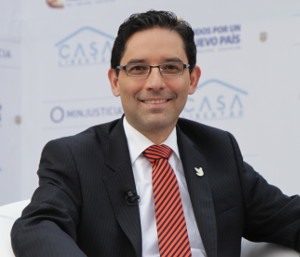 Carlos Medina Ramírez holds a Law degree, with a specialisation in Financial Law, from the Del Rosario University, Bogotá (Colombia). During his significant career he has managed projects concerning citizen security, human trafficking, the fight against arms trafficking, organised crime and narcotics, amongst others.
Carlos Medina Ramírez holds a Law degree, with a specialisation in Financial Law, from the Del Rosario University, Bogotá (Colombia). During his significant career he has managed projects concerning citizen security, human trafficking, the fight against arms trafficking, organised crime and narcotics, amongst others.
Throughout his professional career he has held a number of important national and international offices, such as advisor to the International Organization for Migration, area coordinator for Justice and Security at the United Nations Office on Drugs and Crime (UNODC) in Colombia, and Deputy Director of Strategy and Research at the National Narcotics Bureau, where he was responsible for the entity’s representation before multilateral and bilateral organisations, strategic cooperation and specialised research into the illegal narcotics situation.
He led the National Programme of Houses of Justice, the National Conciliation in Equity Programme and the Civic Coexistence Centres Programme as the Director of Access to Justice of the then Ministry of the Interior and Justice.
Carlos Medina Ramírez was a fellow on the public security course organised by the National Police (CESEP) and a fellow of the State Department of the United States of America. He has also represented Colombia in preparative works for the 6th Private Law Commission of the Organisation of American States; been Technical Secretary of the Intersectoral Commission of Justices of the Peace; and been Colombia’s expert representative before the Expert Group of the Multilateral Evaluation Mechanism of the Inter-American Commission against Drug Abuse of the Organisation of American States, amongst other positions.
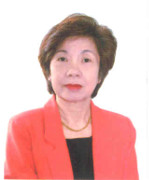
DATUK DR. CHIAM HENG KENG
Founding President of the Early Childhood Care and Education Council of Malaysia, and member of the ASEAN Commission for the Protection of the Rights of Women and Children - Malaysia
Awarded for her outstanding work as a researcher in child psychology, facilitating the improvement of the Malaysian juvenile justice system, her commitment as a teacher in the transmission of values and respect for human rights, as well as for her wisdom as an advisor for many national committees working for the rights of children.
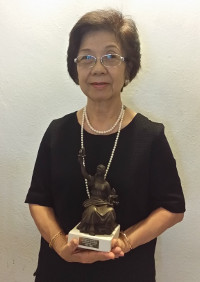 “Louis Pasteur, a French chemist and micro biologist said “when I approach a child, he inspires me in two sentiments; tenderness to what he is and respect to what he may become”, if everyone was to hold the same view as Louis Pasteur, I’m quite sure there would be much fewer children in conflict with the law. Such a view directs society to look for the best in them, even children in conflict with the law and help them develop and utilize their potential for their own being and that of the community and nation.”
“Louis Pasteur, a French chemist and micro biologist said “when I approach a child, he inspires me in two sentiments; tenderness to what he is and respect to what he may become”, if everyone was to hold the same view as Louis Pasteur, I’m quite sure there would be much fewer children in conflict with the law. Such a view directs society to look for the best in them, even children in conflict with the law and help them develop and utilize their potential for their own being and that of the community and nation.”
Chiam Heng Keng
Biography
Datuk Dr. Chiam Heng Keng is a social psychologist whose current works focus on children’s rights and early childhood development, care and education. She was the Professor of Social Psychology at the University of Malaysia, a Human Rights Commissioner of Malaysia (2000-2010) and Malaysia’s Representative to the ASEAN Commission on the Rights of Women and Children (2010-2016).
She is recognized as the foremost authority in early childhood education in Malaysia. She is the founding President of the Early Childhood Care and Education Council, Malaysia which was set up under Malaysia Economic Transformation Programme (ETP) in 2010. She is also a member of the Steering Committee of the Asia Pacific Regional Network of Early Childhood (ARNEC).
She sits on a number of Advisory Councils and on numerous committees as Chairperson, Consultant/ Advisor or Committee Member. Among them are the National Advisory and Consultant Council for Children and the National Council for Coordination of the Protection of Children.
She has authored books, chapters in books and academic journals and was a columnist for more than 10 years in one of the leading newspapers in Malaysia. She is on the Editorial Board of the National Journal on Human Rights, Malaysia and on the International Journal of Child Care and Education Policy, South Korea. Her research spans over a wide range: child development, adolescent development, alienation, juvenile delinquency and justice, gifted education, early childhood education and human rights.
For her service to the nation, she was awarded the Darjah Panglima Jasa Negara which carries the title “Datuk” by the King of Malaysia (2008). Her other awards include Woman Scientist (Education), Hall of Fame, National Science Centre, Malaysia (2004) and Citizenship of Humanity awarded by the National Committee on Human Rights Education, Australia, 2004.

JUDGE SYLVIE ROUSTEAU
Family Court Judge and former Juvenile Court Judge (France)
Awarded for her commitment and contribution for more than 20 years to the improvement of the French juvenile justice system, from her work as judge of the juvenile court, as well as her dedication to the protection of children and young people at risk; also emphasizing her professional and personal involvement in the generation of shared knowledge as a basis on which to continue advancing in the improvement of systems and policies that affect children and youth.
“We shall never forget that within the concept of a juvenile offender or in conflict with the law, there’s juvenile!”
Sylvie Rousteau
Biography
Sylvie Rousteau is currently First Vice-President presiding over family affairs and civil status at the High Court of Rennes.
Appointed magistrate for the first time in 1990, she served as a juvenile judge for 20 years. In this function, she was responsible for both the protection of minors at risk and the treatment of minors in conflict with the law.
Her involvement in juvenile justice began with her very first role in 1990 at the High Court of Brest. She continued to serve as a juvenile judge at the High Court of Nantes from 1992 to 2003 then as Vice-President of the juvenile court of Nantes from 2008 to 2014. She was also responsible for family affairs at the court of la Roche-sur-Yon between 2003 and 2008. Most recently, she presides over family affairs and civil status as First Vice-President at the High Court of Rennes.
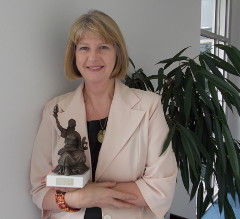
PROFESSOR ANN SKELTON
Director of the Centre for Child Law at the University of Pretoria, UNESCO Chair in Education Law and member of the UN Committee on the Rights of the Child
Awarded for her extensive dedication to the defence of children's rights, empowering the child's role through different media, making their voice truly heard. And especially for her outstanding achievements in improving the juvenile justice system in South Africa, leading the process of drafting new legislation to protect at-risk children.
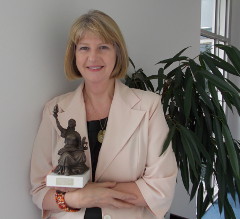 “The ‘Juvenile Justice Without Borders’ International Award has deep meaning for me. It was the plight of child offenders that brought me into the world of children's rights. The International Juvenile Justice Observatory keeps its finger on the pulse of developments on juvenile justice all over the world. The children they worry about are among the world's least loved children, which makes this work all the more important. I hope the IJJO goes from strength to strength, keeping candles burning for child offenders everywhere. It is an important time for juvenile justice, with the Global Study on Juveniles Deprived of Liberty about to start - I look forward to that process and the possibilities for reform that it brings. Thank you for this recognition for the modest role I have played - particularly in my own country. I hope to join the ongoing efforts of IJJO and others, and do more for children in the criminal justice system all over the world, in the coming years.”
“The ‘Juvenile Justice Without Borders’ International Award has deep meaning for me. It was the plight of child offenders that brought me into the world of children's rights. The International Juvenile Justice Observatory keeps its finger on the pulse of developments on juvenile justice all over the world. The children they worry about are among the world's least loved children, which makes this work all the more important. I hope the IJJO goes from strength to strength, keeping candles burning for child offenders everywhere. It is an important time for juvenile justice, with the Global Study on Juveniles Deprived of Liberty about to start - I look forward to that process and the possibilities for reform that it brings. Thank you for this recognition for the modest role I have played - particularly in my own country. I hope to join the ongoing efforts of IJJO and others, and do more for children in the criminal justice system all over the world, in the coming years.”
Ann Skelton
Biography
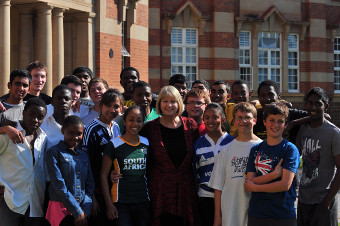 Professor Ann Skelton has worked as a children’s rights lawyer in South Africa for 25 years. She has effectively lobbied for the rights of children in the criminal justice system throughout her career. She chaired the SA Law Reform Committee that drafted the Child Justice Act, and led a UN technical assistance project to prepare for its implementation. Ann is currently the Director of the Centre for Child Law, University of Pretoria. She is an advocate who often appears in the South African superior courts arguing children’s rights issues in public interest law matters – such as Centre for Child Law v Minister of Justice (which abolished minimum sentences and life imprisonment for children) and J v National Director of Public Prosecutions (which abolished automatic placement of child offenders on the sex offenders register). She has published widely on child law both locally and internationally, and is acknowledged as an expert in the field by various UN bodies. She was involved in the drafting of the Model Law on Juvenile Justice for the UNODC in Vienna in 2013. Ann was recently elected as a member of the UN Committee on the Rights of the Child, her term of office starts in 2017.
Professor Ann Skelton has worked as a children’s rights lawyer in South Africa for 25 years. She has effectively lobbied for the rights of children in the criminal justice system throughout her career. She chaired the SA Law Reform Committee that drafted the Child Justice Act, and led a UN technical assistance project to prepare for its implementation. Ann is currently the Director of the Centre for Child Law, University of Pretoria. She is an advocate who often appears in the South African superior courts arguing children’s rights issues in public interest law matters – such as Centre for Child Law v Minister of Justice (which abolished minimum sentences and life imprisonment for children) and J v National Director of Public Prosecutions (which abolished automatic placement of child offenders on the sex offenders register). She has published widely on child law both locally and internationally, and is acknowledged as an expert in the field by various UN bodies. She was involved in the drafting of the Model Law on Juvenile Justice for the UNODC in Vienna in 2013. Ann was recently elected as a member of the UN Committee on the Rights of the Child, her term of office starts in 2017.

DR. RUBÉN VASCONCELOS MÉNDEZ
Director of the Federal Legal Counsel of the Executive Committee of Attention to the Victims of Mexico
Awarded for his intense dedication to the process of reforming and updating the legislative package that composes the Mexican juvenile justice system, faithfully following the principles contained in the Convention of the Rights of the Child; as well as for his personal commitment to the improvement of the situation of children and youth.
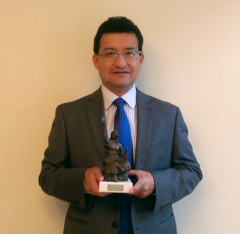 “I feel deeply honoured to have been awarded the ‘Juvenile Justice Without Borders’ International Award. The rights of children and, more specifically, the rights of children in conflict with the law have been the driving force behind my academic and professional activity for a long time. The International Juvenile Justice Observatory has been an invaluable reference for me in the process of searching for experiences and practices related to the implementation of justice systems consistent with the principles set out in the Convention on the Rights of the Child. I fully recognise the work of the Observatory, its efforts to ensure that the rights of children are respected in the justice system as well as the substantial influence it has had on the design of new models that guarantee the continued development of children who find themselves in contact with the law, for whatever reason. This Award is an incentive and an encouragement for me to continue my work in this important field. Our countries’ ongoing development demands that we double our efforts to ensure that social justice is a reality for all of our children. Again, I want to thank you for this award, which I receive with a renewed commitment for defending the rights of all people.”
“I feel deeply honoured to have been awarded the ‘Juvenile Justice Without Borders’ International Award. The rights of children and, more specifically, the rights of children in conflict with the law have been the driving force behind my academic and professional activity for a long time. The International Juvenile Justice Observatory has been an invaluable reference for me in the process of searching for experiences and practices related to the implementation of justice systems consistent with the principles set out in the Convention on the Rights of the Child. I fully recognise the work of the Observatory, its efforts to ensure that the rights of children are respected in the justice system as well as the substantial influence it has had on the design of new models that guarantee the continued development of children who find themselves in contact with the law, for whatever reason. This Award is an incentive and an encouragement for me to continue my work in this important field. Our countries’ ongoing development demands that we double our efforts to ensure that social justice is a reality for all of our children. Again, I want to thank you for this award, which I receive with a renewed commitment for defending the rights of all people.”
Rubén Vasconcelos Méndez
Biography
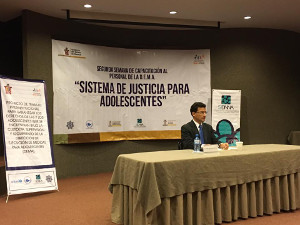 Rubén Vasconcelos holds a degree in Law from the National Autonomous University of Mexico and a PhD in Law (distinction cum laude) at the Complutense University of Madrid, Spain.
Rubén Vasconcelos holds a degree in Law from the National Autonomous University of Mexico and a PhD in Law (distinction cum laude) at the Complutense University of Madrid, Spain.
He has been distinguished as a National Researcher in Mexico’s National System of Researchers; has given classes in Law at numerous universities; published articles and essays in a number of specialist law journals; and given speeches and delivered lectures around the world. He has been Mexico’s principle promoter of reform in the juvenile criminal justice system, teaching in this area across the country in the training of judges, public prosecutors offices, lawyers and specialist police units.
He is the author of a number of books: “Reforma procesal penal y Ministerio Público” (2015); “Avances y retrocesos de la Justicia Penal para Adolescentes” (2014); “Seguimiento de los Procesos de Implementación de la Reforma Penal en México. Informe Estado de México. Sistema Acusatorio Adversarial” (2013); “Principio de Oportunidad y Salidas Alternativas en el Nuevo Proceso Penal Mexicano” (2012); “Constitución y Ministerio Público. Ensayos sobre la reforma penal en Oaxaca” (2011); “Una Corte de Justicia para la Constitución. Justicia constitucional y democracia en México”, (2010). “La justicia para adolescentes en México. Análisis de las leyes estatales”, (2009); “Reporte Oaxaca. Estudios sobre reformas penales comparadas” (2008).
He has occupied various public offices in Mexico, at a federal and state level, including: Deputy Director General of Legislative Studies and Projects at the Technical Secretariat of the Coordination Committee for the Implementation of the Criminal Justice System (SETEC); Executive Secretary of the State Committee on the Rights of Children and Adolescents of Oaxaca; Deputy District-Attorney for the State of Oaxaca; and Chairman of the Guardianship Council for Juvenile Offenders. He is currently the Director General of the Federal Legal Counsel for Victim Care of the Executive Commission for Victim Care.
He has been an advisor on penal reform for a number of groups and associations, as well as an advisor on justice for adolescents to the United Nations Children’s Fund (UNICEF) in Mexico.
Rubén has made a decisive contribution to the creation of the Juvenile Criminal Justice System in Mexico in 2005, in the elaboration of a number of state laws from 2006 to 2015 and in the preparation of the National Law on the Comprehensive Justice System for Adolescents in 2016.